词汇学课件1
合集下载
词汇学-- 词义的分类及分析PPT课件

• Contamination from linguistic collocations;
12
Associative Meaning
Connotative
Meaning 内涵意义
Stylistic
Meaning 文体意义
Affective
Meaning 情感意义
Collocative Meaning 搭配意义
语法意义&词汇意义 • Grammatical meaning indicates
grammatical concept or relationships such as parห้องสมุดไป่ตู้ of speech of words, singular and plural meaning of nouns, tense meaning of verbs and their inflectional paradigm.
所以,一个词在不同的语境中有不同的语法形 式来表达不同的语法意义,但词汇意义却保持 不变。
9
2. Conceptual Meaning & Associative Meaning 概念意义&联想意义
• Conceptual meaning is meaning given in the dictionary and forms the core of word meaning.
• The settings in which such lexemes are employed;
• Cultural values associated with the referents of the lexemes;
• The occurrence of such lexemes in prior texts;
12
Associative Meaning
Connotative
Meaning 内涵意义
Stylistic
Meaning 文体意义
Affective
Meaning 情感意义
Collocative Meaning 搭配意义
语法意义&词汇意义 • Grammatical meaning indicates
grammatical concept or relationships such as parห้องสมุดไป่ตู้ of speech of words, singular and plural meaning of nouns, tense meaning of verbs and their inflectional paradigm.
所以,一个词在不同的语境中有不同的语法形 式来表达不同的语法意义,但词汇意义却保持 不变。
9
2. Conceptual Meaning & Associative Meaning 概念意义&联想意义
• Conceptual meaning is meaning given in the dictionary and forms the core of word meaning.
• The settings in which such lexemes are employed;
• Cultural values associated with the referents of the lexemes;
• The occurrence of such lexemes in prior texts;
Unit 3 Lesson 1 词汇学习课件-高中英语北师大版(2019)必修第一册

➢ surrounding (adj.) 周围的,附近的 ➢ surroundings (n.) 周围的事物,环境
Ⅰ.单句填空 (1) People say it is Canada’s most beautiful city,__s_u_r_r_o_u_n_d_ed__ (surround) by mountains and the Pacific Ocean.
(2) He loves to surround himself __w__it_h__ his family and friends.
➢ surround sb./sth. with ...
(3) I’d like to bring up my child in healthy __s_u_r_ro_u_n_d_i_n_g_s__(surround).
scare
/skeə/
vt.吓唬;使(某人)惊恐
➢ scare sb/sth away (把……吓跑 )
[教材典例P52] Mrs Chen said that it was to scare away the monster Nian.
➢ scared (adj.) 感到害怕的;惊恐的
be scared of doing sth. be scared to do sth.
flight
/flaɪt/
n. 航班
wine
/waɪn/
n.葡萄酒
surround
/səˈraʊnd/
vt. 环绕,围绕
➢ surround sb./sth. with ... (用...包围某人/物) ➢ be surrounded by/with(被...包围)
e.g. The famous pop star was surrounded by his fans.
Ⅰ.单句填空 (1) People say it is Canada’s most beautiful city,__s_u_r_r_o_u_n_d_ed__ (surround) by mountains and the Pacific Ocean.
(2) He loves to surround himself __w__it_h__ his family and friends.
➢ surround sb./sth. with ...
(3) I’d like to bring up my child in healthy __s_u_r_ro_u_n_d_i_n_g_s__(surround).
scare
/skeə/
vt.吓唬;使(某人)惊恐
➢ scare sb/sth away (把……吓跑 )
[教材典例P52] Mrs Chen said that it was to scare away the monster Nian.
➢ scared (adj.) 感到害怕的;惊恐的
be scared of doing sth. be scared to do sth.
flight
/flaɪt/
n. 航班
wine
/waɪn/
n.葡萄酒
surround
/səˈraʊnd/
vt. 环绕,围绕
➢ surround sb./sth. with ... (用...包围某人/物) ➢ be surrounded by/with(被...包围)
e.g. The famous pop star was surrounded by his fans.
词汇学PPT课件

Major Features of Words
1. A word is a sound or combination of sounds which we make voluntarily with out vocal equipment.
Major Features of Words
2. A word is symbolic and is used to stand for something else. In each language, sounds are used to represent objects, happenings, or ideas.
5. A word may consist of one or more morphemes. It can be broken down into smaller meaningful units.
Major Features of Words
6. Words are part of the large communication system we call language. A word is partly dependent for meaning upon its use in that larger context.
1. Definition of a Word
A word is a minimal free form of a language that has a given sound, meaning and syntactic function.(张维友)
Definition of a word
daydream
Mew-mew喵 喵
Naturalists
There is an intrinsic
英语词汇学 ppt课件
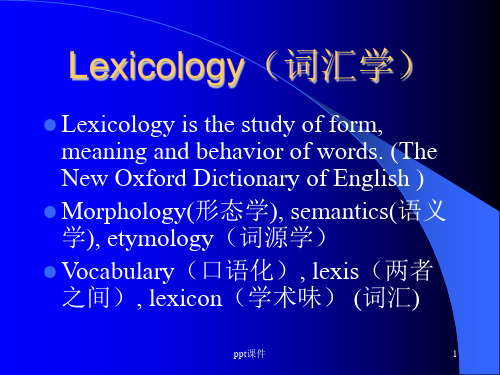
and suffixation? 3. What do we mean by literary and common
words? 4. What is the difference between grammatical
meaning and lexical meaning? 5. What are the differences between
meaning), capable of performing a given syntactic function.词是语言组织中的基本 单位,能独立运用的,具有声音 、意义 和语法功能。
ppt课件
12
1.The Development of the English vocabulary(英语发展史)
eg. (1) hām(home)的变格: Singular
Subjective hām
Possessive hāmes
Patient
hāme
Objective hām
Plural hāmas hāma hāmum hāmas
ppt课件
23
6)Loan Words 外来语
(1) Introduction of Christianity(基督教) Fr. Latin: bargain, cheap, inch, pound, cup, dish, wall, wine, etc.; abbot, alter, candle, disciple, hymn, martyr, num, priest, pope, shrine, temple, etc. (2) Scandinavian invasion — Vikings Fr. Old Norse: are, they, their, them, till, call, die give, take skin, sky, window, ill, weak, etc.
words? 4. What is the difference between grammatical
meaning and lexical meaning? 5. What are the differences between
meaning), capable of performing a given syntactic function.词是语言组织中的基本 单位,能独立运用的,具有声音 、意义 和语法功能。
ppt课件
12
1.The Development of the English vocabulary(英语发展史)
eg. (1) hām(home)的变格: Singular
Subjective hām
Possessive hāmes
Patient
hāme
Objective hām
Plural hāmas hāma hāmum hāmas
ppt课件
23
6)Loan Words 外来语
(1) Introduction of Christianity(基督教) Fr. Latin: bargain, cheap, inch, pound, cup, dish, wall, wine, etc.; abbot, alter, candle, disciple, hymn, martyr, num, priest, pope, shrine, temple, etc. (2) Scandinavian invasion — Vikings Fr. Old Norse: are, they, their, them, till, call, die give, take skin, sky, window, ill, weak, etc.
词汇学之3种构词法PPT课件

counter
act
argument example revolution
5. Prefixes of attitude (3)
anti
social
national clockwise slavery
5. Prefixes of attitude
prefixes
meaning
examples
co-
prefixes meaning
examples
arch-
supreme
archbishop
superout-
more than surpassing
supermarket outlive
sur-
over
surcharge
sub-
below
subnormal
overunder-
excessive too little
meaning
not, the converse
of
examples unwise
nonessential dishonest informal immature illegal irregular
2. Reversative prefixes (1)
un
pack
wrap
do
dress
2. Reversative prefixes (2)
8.Number prefixes
prefixes
quinqu-, pentahexa-, sex-
meaning five
six
sept-, heptaoctaennea-
seven eight nine
examples
quinquagenarian, pentagon
act
argument example revolution
5. Prefixes of attitude (3)
anti
social
national clockwise slavery
5. Prefixes of attitude
prefixes
meaning
examples
co-
prefixes meaning
examples
arch-
supreme
archbishop
superout-
more than surpassing
supermarket outlive
sur-
over
surcharge
sub-
below
subnormal
overunder-
excessive too little
meaning
not, the converse
of
examples unwise
nonessential dishonest informal immature illegal irregular
2. Reversative prefixes (1)
un
pack
wrap
do
dress
2. Reversative prefixes (2)
8.Number prefixes
prefixes
quinqu-, pentahexa-, sex-
meaning five
six
sept-, heptaoctaennea-
seven eight nine
examples
quinquagenarian, pentagon
词汇学Word-Meaningppt课件

16
(3).Social meaning: Based on: ①the social relationship between the
speakers;②the occasion;③the subject matter;④ the mode of speech;etc. eg: What’s your age? (对求职者)
14
2.Lexical meaning:
(1).Denotative meaning: It is the central factor in linguistic communication. eg: chair → 椅子 mother → 母亲 man → 男人 woman → 女人 politician → 政客 blood → 血液 chicken → 小鸡 adumeaning: eg: chair → 官位 mother → love, care, tenderness man → 勇敢,强壮,责任心,大度 woman → 意志薄弱,爱流泪,多情善感 (Anyway,she is a woman.) politician → 欺诈,夸夸其谈 blood → 出身,亲情,民族 (Blood is thicker than water. He has Canadian blood) chicken → 懦弱,胆怯 adult → 责任
你吃了吗? (denotative meaning; connotative meaning)
17
(4).Affective meaning: a.Interjections: Oh! Alas! Ouch! b.Approval and disapproval: mother, scholar, masterpiece, career, buzz, gang, boast, workaholic, etc. c.Bias: slender — skinny, statesman — politician, famous — notorious proud — arrogant (褒义) (贬义)
(3).Social meaning: Based on: ①the social relationship between the
speakers;②the occasion;③the subject matter;④ the mode of speech;etc. eg: What’s your age? (对求职者)
14
2.Lexical meaning:
(1).Denotative meaning: It is the central factor in linguistic communication. eg: chair → 椅子 mother → 母亲 man → 男人 woman → 女人 politician → 政客 blood → 血液 chicken → 小鸡 adumeaning: eg: chair → 官位 mother → love, care, tenderness man → 勇敢,强壮,责任心,大度 woman → 意志薄弱,爱流泪,多情善感 (Anyway,she is a woman.) politician → 欺诈,夸夸其谈 blood → 出身,亲情,民族 (Blood is thicker than water. He has Canadian blood) chicken → 懦弱,胆怯 adult → 责任
你吃了吗? (denotative meaning; connotative meaning)
17
(4).Affective meaning: a.Interjections: Oh! Alas! Ouch! b.Approval and disapproval: mother, scholar, masterpiece, career, buzz, gang, boast, workaholic, etc. c.Bias: slender — skinny, statesman — politician, famous — notorious proud — arrogant (褒义) (贬义)
英语词汇学精品PPT课件
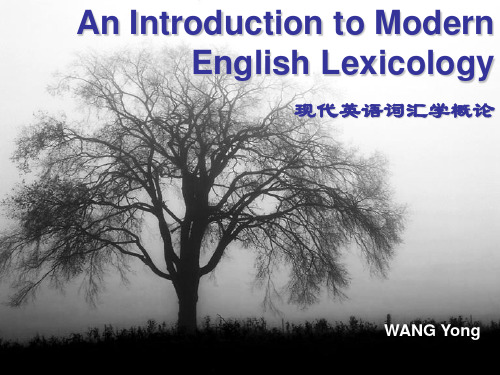
-- from Linguistics in Language Teaching. Cambridge, MA: MIT Press.,1972: 111 (Wilkinson)
9
About the course
ORIENTATION
10
1.1 Aims of the course
– Give a systematic description of the English vocabulary.
16
• What is a word?
– The minimal free form of a language, which has a given sound, meaning and syntactic function.
– Ultimately improve your receptive and productive skills in language processing as well as language production.
12
1.3 Arrangements
• Oral Presentation
– Group of 4-5 for ONE CHAPTER – One group each week
• Essay
– A short essay about the relevant topic(s) – 3 weeks before the end of the course
13
1.4 Grade
• Oral presentation • Short essay • Final exam
14
An Introduction to Modern English Lexicology
9
About the course
ORIENTATION
10
1.1 Aims of the course
– Give a systematic description of the English vocabulary.
16
• What is a word?
– The minimal free form of a language, which has a given sound, meaning and syntactic function.
– Ultimately improve your receptive and productive skills in language processing as well as language production.
12
1.3 Arrangements
• Oral Presentation
– Group of 4-5 for ONE CHAPTER – One group each week
• Essay
– A short essay about the relevant topic(s) – 3 weeks before the end of the course
13
1.4 Grade
• Oral presentation • Short essay • Final exam
14
An Introduction to Modern English Lexicology
词汇学第一讲
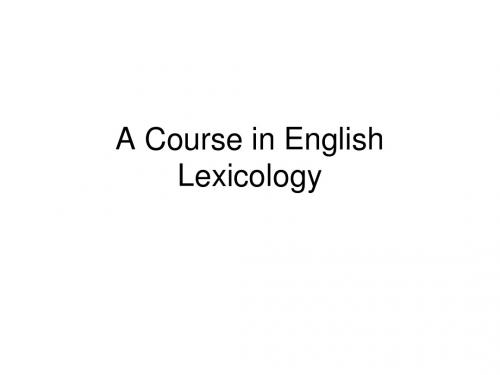
1.3 Sound and Form
• It is generally agreed that the written form of a natural language is the orthographical(拼法) record of the oral form. Naturally the written form should agree with the oral form. In other words, the sound should be consistent with the form. • Question: Do you think such viewpoint lies in our real language world?
• To sum up, the definition of a word will cover the following points: • (1)a minimal free form of a language • (2)a sound unity • (3) a unit of meaning • (4) a form that can function alone in a sentence. • Then can you give a definition according to the above points?
• Example, some short vertical strokes such as “i, u, v, m, w, n” looked all alike, consequently, their handwriting caused misunderstanding, to solve the problem in part, they changed the letter “u” to “ o ”when it came before “m, n, v.”(we have no “uv”, immoral, impolite, illegal, irregular)
英语词汇学授课课件 PPT
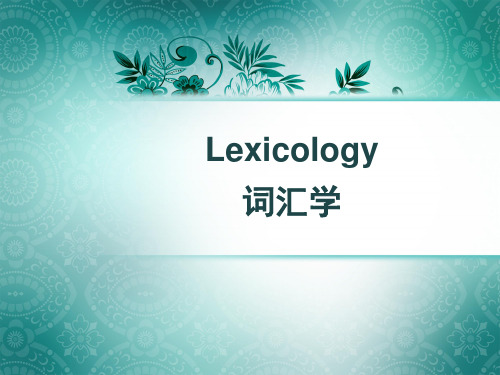
❖ 2. synonyms and idioms
B: rapid growth of present-day English Vocabulary and Its causes
❖ Neologisms(新词) after World War II ❖ Reasons: ❖ 1. progress of science and technology科技
❖ This definition emphasizes syntax(句法), but does not touch upon meaning.
Antoine Meillet
❖ “A word is defined by the association of a given sense with a given group of sounds capable of a given grammatical use.” (p.2, para.2 )
Bloomfield布洛姆菲尔德(美国语言学家教育 家) and ❖ a French linguist, Antoine Meillet(梅耶,法 国语言学家)
Bloomfield
❖ “some linguistic forms(语言形态), which we call bound forms(限定/非自由形态) are never used as sentences.
invaded by Angles盎格鲁, Saxons撒克逊, Jutes朱特人
❖ Vocabulary: 5000-6000 words,chiefly Anglo-Saxon/ some Old Norse古斯堪的那维 亚语
❖ Old Norse words (are, they, their, them, till, call, die, give, take, skin, window, ill, weak)
B: rapid growth of present-day English Vocabulary and Its causes
❖ Neologisms(新词) after World War II ❖ Reasons: ❖ 1. progress of science and technology科技
❖ This definition emphasizes syntax(句法), but does not touch upon meaning.
Antoine Meillet
❖ “A word is defined by the association of a given sense with a given group of sounds capable of a given grammatical use.” (p.2, para.2 )
Bloomfield布洛姆菲尔德(美国语言学家教育 家) and ❖ a French linguist, Antoine Meillet(梅耶,法 国语言学家)
Bloomfield
❖ “some linguistic forms(语言形态), which we call bound forms(限定/非自由形态) are never used as sentences.
invaded by Angles盎格鲁, Saxons撒克逊, Jutes朱特人
❖ Vocabulary: 5000-6000 words,chiefly Anglo-Saxon/ some Old Norse古斯堪的那维 亚语
❖ Old Norse words (are, they, their, them, till, call, die, give, take, skin, window, ill, weak)
词汇学-1

Collocative meaning (cont’d)
• Collocative meaning overlaps with stylistic and affective meanings, because in a sense, both stylistic and affective meanings are revealed by means of collocations.
Chapter 1
词的概述
Word
• Form: pronunciation and spelling (surface structure) • Meaning: what the form stands for (deep structure)
Word meaning
The meanings of “meaning” in the languages
Lexical meaning (cont’d)
• Functional words have little lexical meaning, but process grammatical meaning. • Content words have both meanings, lexical meaning in particular. These two make up the word meaning.
Conceptual meaning
• Also called denotative meaning, the meaning given in the dictionary and forms the core of word meaning.
• The basis for communication as the same word has the same conceptual meaning to all speakers of the same language.
Unit19Lesson1词汇学习课件北师大版选修七

adjust to 适应于 adjust (sth./oneself) to (doing) sth. 使(某物/某人自己)适应(做)某事 make an adjustment 做出调整
7. dedicate
vt. to give a lot of your time and effort to a particular activity or purpose because you think it is important 把…奉献给
Ⅰ.词性变化
1. fluency n.流利度,流畅度
fluent adj.流畅的,流利的 fluently adv.流利地,流畅地
2. accuracy n.精确度,准确度
accurate adj.精确的 accurately adv.精确地
3. royal
adj.王室的,皇家的
royalty n.王室,皇家
goals/targets
attainment n. something that you
achieved成就
eg.
scientific/medical attainments
3. surround
vt. to be all around sth/sb 围绕
eg. The lake is completely surrounded
eg. He dedicated his life to helping the poor. Word family dedicated adj. 献 身 的 ; 专 心 致 志 的 eg. a dedicated doctor dedication n.U 奉 献 ; 专 心 致 志 eg. hard work and
7. dedicate
vt. to give a lot of your time and effort to a particular activity or purpose because you think it is important 把…奉献给
Ⅰ.词性变化
1. fluency n.流利度,流畅度
fluent adj.流畅的,流利的 fluently adv.流利地,流畅地
2. accuracy n.精确度,准确度
accurate adj.精确的 accurately adv.精确地
3. royal
adj.王室的,皇家的
royalty n.王室,皇家
goals/targets
attainment n. something that you
achieved成就
eg.
scientific/medical attainments
3. surround
vt. to be all around sth/sb 围绕
eg. The lake is completely surrounded
eg. He dedicated his life to helping the poor. Word family dedicated adj. 献 身 的 ; 专 心 致 志 的 eg. a dedicated doctor dedication n.U 奉 献 ; 专 心 致 志 eg. hard work and
高中英语选择性必修二Unit1词汇学习课件

归纳: 吸烟与癌症之间的联系_t_h_e_l_in_k__b_e_t_w_e_e_n_s_m__o_k_i_n_g_a_n_d__c_a_n_c_e_r
把...与...连接/联系起来_l_i_n_k_._.._w_i_th__.._. _ 与...有联系_b_e__li_n_k_e_d_t_o_/_w_i_th_._..__
词汇学习1
1.suspect vt/vi. 怀疑;疑有;不信任 n. 犯罪嫌疑人;可疑对象
归纳:怀疑某人做某事_s_u_s_p_e_ct__sb__o_f_d_o_in__g_s_th__ 被怀疑做某事 _b_e_s_u_s_p_e_c_te_d__o_f_d_o_in__g_s_th__
应用:我怀疑这位专家作了错误的推断。 _I_s_u_s_p_e_c_t_t_h_e_e_x_p_e_r_t _o_f _m_a_k_i_n_g_w__r_o_n_g_i_n_fe_r_e_n_c_e_s_.
6. break out (战争、火灾、打斗等不愉快的事情)突然开始;爆发
应用: 昨晚爆发了一场严重的火灾,多人丧生。 _A__s_e_ve_r_e_f_i_re__b_r_o_k_e_o_u_t_l_a_st__n_ig_h_t_,_k_il_l_in_g__m_u_l_ti_p_le__p_e_o_p_le_.___.
(最终;彻底地).
6. Thanks to the authority’s intervention, the problem _w__a_s__h__a_n_d__l_e_d_(handle)
eventually.
7. I can’t subscribe to your plan as our ideas are obviously _c_o_n__t_r_a_d__ic__to__r_y__
把...与...连接/联系起来_l_i_n_k_._.._w_i_th__.._. _ 与...有联系_b_e__li_n_k_e_d_t_o_/_w_i_th_._..__
词汇学习1
1.suspect vt/vi. 怀疑;疑有;不信任 n. 犯罪嫌疑人;可疑对象
归纳:怀疑某人做某事_s_u_s_p_e_ct__sb__o_f_d_o_in__g_s_th__ 被怀疑做某事 _b_e_s_u_s_p_e_c_te_d__o_f_d_o_in__g_s_th__
应用:我怀疑这位专家作了错误的推断。 _I_s_u_s_p_e_c_t_t_h_e_e_x_p_e_r_t _o_f _m_a_k_i_n_g_w__r_o_n_g_i_n_fe_r_e_n_c_e_s_.
6. break out (战争、火灾、打斗等不愉快的事情)突然开始;爆发
应用: 昨晚爆发了一场严重的火灾,多人丧生。 _A__s_e_ve_r_e_f_i_re__b_r_o_k_e_o_u_t_l_a_st__n_ig_h_t_,_k_il_l_in_g__m_u_l_ti_p_le__p_e_o_p_le_.___.
(最终;彻底地).
6. Thanks to the authority’s intervention, the problem _w__a_s__h__a_n_d__l_e_d_(handle)
eventually.
7. I can’t subscribe to your plan as our ideas are obviously _c_o_n__t_r_a_d__ic__to__r_y__
词汇学PPT chapter 1
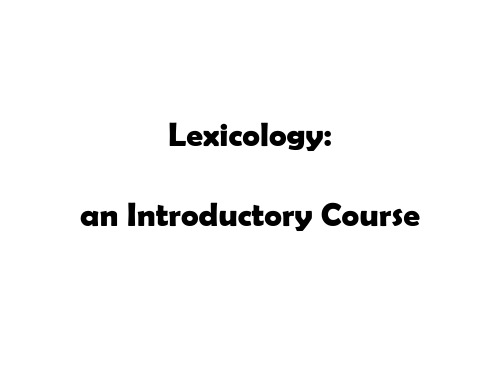
• The written form of English is, therefore, an imperfect representation of the phonemic elements of the spoken language (Quirk 1978).
1.4 Sound and Form
1.5 Classification of Words
1. the basic word stock & nonbasic vocabulary 2. content words & functional words 3. native words & borrowed words … 1=2=3=English vocabulary 1. use frequency 2. by notion 3. by origin
1.5.3 native words & borrowed words
native words • Words of Anglo-Saxon origin are small in number, but they form the mainstream of the basic word stock and stand at the core of the language. • They also have the features of the basic word stock.
1.3 Sound and Meaning
• There is ‘no logical relationship between the sound which stands for a thing or an idea and the actual thing and idea itself. • It is only a symbolic connection. • In different languages the same concept can be represented by different sounds.
英语词汇学教程 全套课件-精选文档

Unit 1 英语词汇概说
1.1 Language, Linguistics and Lexicology
What is language?
Language is a system of arbitrary vocal symbols used for human communication. It is a specific social action and a carrier of information.
没有语法,人们可以表达的事物寥寥无几; 而没有词汇,人们则无法表达任何事物。 ---英国语言学家威尔金斯(Wilkins)
《英语词汇学教程》 A Survey of English Lexicology
理论指导:现代英语语言。 研究对象:英语词汇。 学习内容:单词的结构、构词法、单词的意义及 词义关系、英语词汇的构成、词义的历史演变、 成语及词典知识。 学习目标:1.比较系统地掌握英语词汇的知识; 2.比较深入地了解英语词汇的现状及其历史演变 过程;3.能对现代英语词汇发展的趋势和所出现 的现象作出分析和解释,提高运用英语的能力。
英谷物不是干货heartman换心人不是有心人maddoctor精神病科医生不是发疯的医生eleventhhour最后时刻不是十一点blinddate由第三者安排的男女初次会面并非盲目约会或瞎约会personalremark人身攻击不是个人评论sweetwater淡水不是糖水或甜水confidenceman骗子不是信得过的人criminallawyer刑事律师不是犯罪的律师servicestation加油站不是服务站restroom厕所不是休息室dressingroom化妆室不是试衣室或更衣室horsesense常识不是马的感觉capitalidea好主意不是资本主义思想familiartalk庸俗的交谈不是熟悉的谈话blacktea红茶不是黑茶blackart妖术不是黑色艺术blackstranger完全陌生的人不是陌生的黑人whitecoal作动力来源用的水不是白煤whiteman忠实可靠的人不是皮肤白的人yellowbook黄皮书法国政府报告书以黄纸为封不是黄色书籍redtape官僚习气不是红色带子greenhand新手不是绿手bluestocking女学者女才子不是蓝色长统袜chinapolicy对华政策不是中国政策chinesedragon麒麟不是中国龙americanbeauty一种玫瑰名为美国丽人不是美国美女englishdisease软骨病不是英国病indiansummer愉快宁静的晚年不是印度的夏日greekgift害人的礼品不是希腊礼物spanishathlete吹牛的人不是西班牙运动员fren Much Do You Know About the English Vocabulary?
词汇学.ppt课件

• 1.不同语言之间的词汇关系研究 • 涉及多语种的词汇异同比较 • 日语:化粧室 • 韩语:화장실 • 汉语:? • 汉语:信件 • 日语:?(手纸) • 文字差异带来的问题
• 日汉比较词汇
• 秦礼君
• 中国科学技术大学出 版社
• 2.纵向:同一语言的词汇发展关系研究 • 古今词汇演变、差异/词汇发展史 • “是女子不好,烦大巫妪(yu4)为入报河伯,得
词汇学在对外汉语教学中的价值
两个字把老外搞疯!
• 1.吃饭时,一人说去方便一下,老外不解,旁人 告诉他"方便"就是:上厕所;
• 2.敬酒时,另一人对老外说,希望下次出国时能 给予方便,老外纳闷不敢问;
• 3.酒席上,电视台女主持人提出,在她方便的时 候会安排老外做专访。老外愕然:怎么能在你方 便的时候?女主持人说,那在你方便时,我请你 吃饭。老外简直不敢相信!
有学生写出这样的句子:“我每天都很 忙, 白天做功课, 晚上练习生子。”
• 词汇理据与词汇教学 研究
• 吴会芹、胡海鹏、施 亚波、 等
• 浙江大学出版社
• 词汇教学研究相当薄弱, • 本体研究成果向教学的转化能力不足
期望与要求
• 读万卷书 博采众长 • 每种教材都不能覆盖所有词汇问题 • 相互参照,取长补短,丰富知识 • 养成通读教材的习惯
4.词汇学与其它领域的跨学科研究
• 我们去唱歌吧。 • *我们去歌唱吧。
• 这个不适合我。 • *这个不合适我。
• 词汇:语法50年(19602010)
• 郑定欧
• 世界图书出版公司北 京公司
• 词汇语义学与词典编纂 • 张志毅、 张庆云 • 外语教学与研究出版社
• 词汇学词典学研究 • 周荐 • 商务印书馆
- 1、下载文档前请自行甄别文档内容的完整性,平台不提供额外的编辑、内容补充、找答案等附加服务。
- 2、"仅部分预览"的文档,不可在线预览部分如存在完整性等问题,可反馈申请退款(可完整预览的文档不适用该条件!)。
- 3、如文档侵犯您的权益,请联系客服反馈,我们会尽快为您处理(人工客服工作时间:9:00-18:30)。
I. The development of English vocabulary.
A. Three periods of English language. 1. Old English (450-1100) About 50,000 or 60,000 words. 80% was no longer used. During this period, there are two historical events that have a great influence on English very much. Latin had a great influence on English. ( bargain, cheap, pound, inch, cup, pope, priest, temple, hymn, candle)
b. late modern English (after 1700)
French greatly influenced English words. The territorial expansion of English empire resulted in the expansion of English vocabulary. Borrowed words from non-European countries. Potato, tobacco, chocolate from Mexican Banana, zebra from Africa, coffee from Turkey
II. The content of lexicology
Chapter One General survey of English vocabulary Chapter Two Morphological structure of English words Chapter Three Word-Formation Chapter Four Word meaning and semantic features Chapter Five Polysemy and homonymy Chapter Six Sense relations between words Chapter Seven Meaning and context Chapter Eight Changes in word meaning Chapter Nine English idioms
3. Modern English (1500-the present)
a. In the early stage (1500-1700)-Early modern English
The Renaissance brought great changes to vocabulary. Latin words and Greek words were introduced to English. Latin words on science were introduced. e.g. chemist, function, scientific etc. Greek words: e.g. comedy Drama,, tragedy, criterion, physics
Chapter One General Survey of English Vocabulary
The definition of “word”, “vocabulary”. For centuries, linguists have given different definitions to “word”. Generally, there are two common definitions by 2 linguists. By Bloomfield: A word is a minimum free form. It can be used separately in a sentence. Free form is a form which occurs as a sentence. e.g. Wait, lion, agree Bound form can never be used in a sentence. e.g. Lioness, waiter, agreement, allowed, unfair
Introduction of the course
I. The definition of “lexicology”
Lexicology: A branch of linguistics concerned with the vocabulary of the English language in respect to words and words equivalents. W.E. : an idiom and set phrase representing a semantic unit and functioning as a single word in a sentence. 1.She is the apple of his father’s eye. 2. He’s well off.
2. Borrowed/Loaned words in the English vocabulary.
1)The French element in the English vocabulary. a. French loaned words in the Middle English. b. After Middle English ( words connected with art, food, and drink. e.g. chef, restaurant, café, prestige, fiancée, bourgeois) 2) The Latin element a. Latin words in the old English. (church, pope, priest, temple, hymn, candle)
Scandinavian ( them, both, anger, cake, egg, leg, sky, sister, happy, ill, weak, wrong, ugly, loose, die, trust, want, call, get, hit, give) 2. Middle English (1100-1500) During this period, French has a great effect on English vocabulary. e.g. Law (judge, justice, government, parliament) religion (baptism, confess, divine) clothing (coat, dress, gown) food (beef, mutton, pork) science (medicine, surgeon)
II. English new words (Neologisms) 1.The reasons of the rapid growth of present day English vocabulary 1) The rapid development of modern science and technology.
b. Latin words in the Middle English. ( genius, include, history, legal, minor, picture, nervous, necessary, popular, private, polite, quite, moderate , prevent) c. Latin borrowings after the Renaissance. During this period, some abstract and scientific words were adopted. e.g. education, civil, examination, autograph, expensive, appropriate, emancipation, exist, extinguish
4) The Scandinavian element ( them, both, anger, cake, egg, leg, sky, sister, happy, ill, weak, wrong, ugly, loose, die, trust, want, call, get, hit, give) 5) Other foreign elements. Italian. (art, architecture. e.g. balcony, design, corridor, violin,, solo, duet.) concert, piano Germany: zinc, quartz, waltz. Indian English: ginger, jungle, pajamas Japanese: tycoon, tatami, soy, Judo Chinese: typhoon, tea, wok, silk, china
a. Words connected with nuclear bomb b. Words connected with space. e.g. astronaut, spaceman, space-station, space suit, space shuttle. c. Words on computer.
B. Two groups of English vocabulary.
1. Words of native origin. Native words are the foundation and the core of English vocabulary. They are mostly monosyllabic ords, express the fundamental concepts dealing with everyday objects and life. 100, the most commonly-used words are all from native words. Linguists say that if you know 1000 the most common-used English words, you can understand English article 80% Native words are basic words in English vocabulary.
